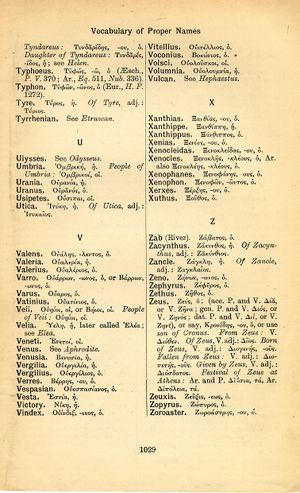Vesta
English > Greek (Woodhouse)
Ἑστία, ἡ.
Latin > English (Lewis & Short)
Vesta: ae, f. Sanscr. root vas, to burn; vasaras, day; whence also Gr. Εστία.
I Another name for Ops, Cybele, Terra, the wife of Cœlus and mother of Saturn, Cic. N. D. 2, 27, 67; Ov. F. 6, 267.—
II Her granddaughter, daughter of Saturn, the goddess of flocks and herds, and of the household in general, Cic. N. D. 2, 27, 67; id. Leg. 2, 12, 29; id. Div. 1, 45, 101; id. Fam. 14, 2, 2; id. de Or. 3, 3, 10; in her temple the holy fire burned perpetually, attended by the Vestal virgins, id. Leg. 2, 8, 20; id. Cat. 4, 9, 18; Liv. 28, 11; 4, 52: Vestae sacerdos, i. e. the Pontifex maximus, of Cœsar, Ov. F. 5, 573; id. M. 15, 778.—
B Poet., transf.
1 The temple of Vesta: quo tempore Vesta Arsit Ov. F. 6, 437; cf. id. ib. 6, 234; 6, 713.—
2 Fire: ter liquido ardentem perfudit nectare Vestam, Verg. G. 4, 384; Sil. 6, 76.— Hence, Vestālis, e, adj., of or belonging to Vesta, Vestal: festi, Ov. F. 6, 395: ara, Luc. 1, 549: foci, id. 1, 199: virgines, priestesses of Vesta, Vestal virgins, Vestals, Cic. Leg. 2, 8, 20; id. Rep. 2, 14, 26; 3, 10, 17; Liv. 4, 44 fin.—Sing., Gell. 1, 12, 9: sacerdos, id. 1, 12, 14 al.—
B Substt.
1 Ve-stālis, is, f. (virgo), a priestess of Vesta, a Vestal, Liv. 1, 3 sq.; Plin. 28, 4, 7, § 39; Ov. F. 2, 383 al.—Hence, as adj.: Vestales oculi, of the Vestals, Ov. Tr. 2, 311.—
2 Ve-stālĭa, ĭum, n., the festival of Vesta, Varr. L. L. 6, 3, 17.

